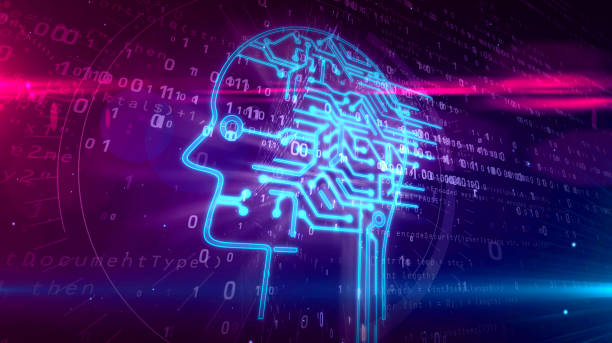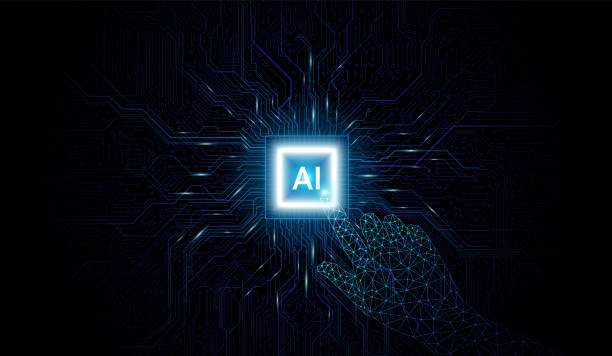What is Artificial Intelligence and Why is it Important?
Artificial Intelligence (AI) is a branch of computer science that deals with building machines capable of performing tasks that typically require human intelligence.
These tasks include learning, reasoning, problem-solving, understanding natural language, pattern recognition, and decision-making.
The importance of #Artificial_Intelligence in today’s world lies in its ability to automate processes, increase efficiency, improve accuracy, and provide innovative solutions to complex problems.
Its applications include voice assistants, self-driving cars, medical diagnosis, and data analysis.
Artificial intelligence is rapidly reshaping various industries and has the potential to create tremendous transformations in our lives.
In fact, artificial intelligence tries to create systems that can think, learn, and decide like humans.
This technology is not only used in various industries, but also plays a prominent role in our daily lives.
Given the ever-increasing advances in this field, artificial intelligence is expected to become one of the most important factors in the development and progress of societies in the near future.
Are you losing potential customers due to an unprofessional website? Rasaweb is your answer! With our specialized corporate website design services:
✅ Enhance the credibility and standing of your business
✅ Experience attracting more targeted customers
⚡ Take action now to receive a free consultation!
History and Evolution of Artificial Intelligence
The history of artificial intelligence dates back to the 1950s, when researchers began exploring the possibility of building intelligent machines.
One of the early milestones was the Turing test, proposed by Alan Turing, which is known as a benchmark for measuring the intelligence of machines.
In the following decades, progress was made in areas such as natural language processing and expert systems.
However, the development of artificial intelligence also faced challenges and limitations, including a lack of computing power and sufficient data.
In recent years, with the advent of deep learning and increased access to big data, we have seen remarkable advances in artificial intelligence.
These advances have led to the development of systems capable of performing tasks that were previously considered impossible, such as facial recognition, language translation, and playing games at a professional level.
Click here to preview your posts with PRO themes ››
Today, artificial intelligence has become one of the most popular research areas, and various companies and organizations are making extensive investments in this field.
Among the most important recent achievements is the development of large language models such as GPT-3 and BERT, which are capable of generating high-quality texts and understanding natural language.
However, there are still many challenges in the field of artificial intelligence, including issues related to ethics, security and reliability.
Types of Artificial Intelligence and Their Applications
Artificial intelligence is generally divided into two main categories: Narrow AI and General AI.
Narrow AI refers to systems that are designed to perform a specific task, such as facial recognition or playing chess.
Strong AI refers to systems that are capable of performing any intellectual task that a human can perform.
The applications of artificial intelligence are very broad and include:
- Health and medicine: disease diagnosis, drug development, and surgical robots
- Finance: automation of banking processes, fraud detection, and risk management
- Retail: product recommendations, price optimization, and supply chain management
- Transportation: self-driving cars, route optimization, and traffic management
- Manufacturing: automation of manufacturing processes, quality control, and failure prediction
Also, artificial intelligence has many applications in areas such as education, entertainment, and security.
| Type of AI | Description | Example |
|---|---|---|
| Narrow AI | Focused on performing a specific task | Voice assistants like Siri and Alexa |
| General AI | Capable of performing any intellectual task that a human performs | (Still under development) |
| Field | Application |
|---|---|
| Health and medicine | Disease diagnosis |
| Finance | Fraud detection |
| Retail | Product recommendations |
Machine Learning and Deep Learning in Artificial Intelligence
Machine Learning (ML) is a subset of artificial intelligence that allows machines to learn from data without explicit programming.
Machine learning includes various algorithms that can identify patterns in data and use them to make predictions or decisions.
Deep Learning (DL) is a subset of machine learning that uses deep neural networks to learn from data.
Deep neural networks consist of multiple layers of nodes that allow machines to identify more complex patterns in data.
Deep learning has achieved remarkable success in areas such as computer vision, natural language processing, and speech recognition.
The key difference between machine learning and deep learning is that deep learning does not require manual feature engineering, while in traditional machine learning, engineers must extract relevant features from the data.
In short, machine learning is a general approach to training machines from data, while deep learning is a specific method that uses deep neural networks for this purpose.
Both methods play an important role in the development of artificial intelligence and allow machines to perform complex tasks that were previously considered impossible.
Are you unhappy with low sales from your online store?
Rasaweb is your solution for having a professional and high-selling online store.
✅ Significant increase in sales and income
✅ Easy and enjoyable shopping experience for customers
⚡ Get a free consultation from Rasaweb right now!
Challenges and Limitations of Artificial Intelligence
Despite remarkable advances in artificial intelligence, there are still numerous challenges and limitations that need to be addressed.
One of the most important challenges is the ethical issues related to the use of artificial intelligence.
These issues include discrimination, privacy, accountability, and the impact of artificial intelligence on employment.
Also, artificial intelligence is still limited in understanding and reasoning at the human level and cannot perform well in complex and unexpected situations.
In addition, the dependence of artificial intelligence on large and high-quality data can be a challenge, as collecting and labeling this data can be time-consuming and costly.
Also, the vulnerability of artificial intelligence to cyber attacks and data manipulation is a serious concern.
In general, artificial intelligence is still in the early stages of its development and needs more research and development to reach its full potential.
Also, for the responsible and ethical use of artificial intelligence, we need to create appropriate legal and ethical frameworks.
Otherwise, we may face unintended and unpredictable consequences.
The Future of Artificial Intelligence and its Impact on Society
The future of artificial intelligence is very bright and full of potential.
Artificial intelligence is expected to become increasingly integrated into our lives in the coming years and have profound effects on society.
Among the most important future trends, the following can be mentioned:
- Increased automation of processes and jobs
- Development of smarter and more autonomous systems
- Integration of artificial intelligence with other technologies such as the Internet of Things (IoT) and blockchain
- The impact of artificial intelligence on education and learning
- Changing the role of humans in work and life
However, to fully benefit from the benefits of artificial intelligence, we must also pay attention to its challenges and issues.
Among the most important issues, the need to create new job opportunities, train new skills, and ensure the ethical and responsible use of artificial intelligence can be mentioned.
Also, we must pay attention to issues related to privacy, security, and discrimination to prevent the creation of new inequalities.
Ultimately, the future of artificial intelligence depends on the decisions we make today.
By investing in research and development, creating appropriate legal and ethical frameworks, and training a skilled workforce, we can use artificial intelligence to create a better and fairer society.
Key Concepts in Artificial Intelligence
To better understand artificial intelligence, it is necessary to be familiar with the following key concepts:
- Algorithm: a set of instructions to solve a problem
- Data: raw information used to train machines
- Model: a representation of data learned by an algorithm
- Neural network: a computational model inspired by the structure of the human brain
- Supervised learning: a machine learning method in which the machine is trained using labeled data
- Unsupervised learning: a machine learning method in which the machine is trained using unlabeled data
- Reinforcement learning: a machine learning method in which the machine is trained by receiving rewards or penalties
These concepts are only part of the vast world of artificial intelligence, but understanding them is essential to start learning and working in this field.
| Concept | Description |
|---|---|
| Algorithm | A set of instructions to solve a problem |
| Data | Raw information for training machines |
| Model | A representation of data learned by an algorithm |
| Type of Learning | Description |
|---|---|
| Supervised Learning | Training a machine with labeled data |
| Unsupervised Learning | Training a machine with unlabeled data |
| Reinforcement Learning | Training a machine by receiving rewards or penalties |
How to Learn Artificial Intelligence?
Learning artificial intelligence can be an exciting and rewarding journey.
To start, you can use online resources such as training courses, books, articles, and videos.
Also, participating in artificial intelligence workshops and conferences can help you connect with experts and learn from their experiences.
For practical learning, you can do small artificial intelligence projects and use open-source tools and libraries such as TensorFlow and PyTorch.
Also, participating in online artificial intelligence communities can help you get feedback and learn from others.
In general, learning artificial intelligence requires patience, perseverance, and a willingness to learn continuously.
With effort and practice, you can acquire the skills needed to work in this field and become an artificial intelligence developer.
To start learning artificial intelligence, you can use online training courses such as Coursera, edX, and Udacity.
These courses usually include basic concepts, algorithms, and applications of artificial intelligence.
You can also use educational books such as “Artificial Intelligence A Modern Approach”.
How much does losing business leads due to an unprofessional site cost you? Solve this problem forever with professional corporate website design by Rasaweb!
✅ Increased credibility and trust of potential customers
✅ Easier attraction of new business leads
⚡ Get a free consultation now!
Key Tools and Technologies of Artificial Intelligence
To develop and implement artificial intelligence systems, we need to use various tools and technologies.
Among the most important of these tools and technologies, the following can be mentioned:
- Programming languages such as Python and R
- Machine learning libraries such as TensorFlow, PyTorch, and scikit-learn
- Data processing tools such as Apache Spark and Hadoop
- Cloud platforms such as Amazon AWS, Google Cloud, and Microsoft Azure
- Data visualization tools such as Tableau and Matplotlib
These tools and technologies allow artificial intelligence developers to easily train machine learning models, process data, and visualize results.
Also, cloud platforms provide access to powerful computing resources and artificial intelligence services.
For example, TensorFlow is an open-source library developed by Google and used to build and train deep learning models.
PyTorch is another open-source library used for deep learning and artificial intelligence research.
Career Future in the Field of Artificial Intelligence
Given the rapid growth of artificial intelligence, many job opportunities are being created in this field.
Among the most important job roles, the following can be mentioned:
- Data Scientist
- Machine Learning Engineer
- AI Engineer
- AI Researcher
- Data Analyst
To succeed in these roles, it is necessary to have strong technical skills, in-depth knowledge in the field of artificial intelligence, and the ability to solve complex problems.
Also, communication and teamwork skills are very important.
For example, a data scientist is responsible for collecting, processing, and analyzing data and uses machine learning models to solve business problems.
A machine learning engineer is responsible for developing and implementing machine learning models and must be familiar with various artificial intelligence tools and technologies.
Ultimately, the career future in the field of artificial intelligence is very promising, and people who have the necessary skills can achieve great success in this field.
Also, given the growing need for artificial intelligence experts, the salaries and benefits of these jobs are expected to increase in the coming years.
Artificial Intelligence is a unique opportunity for business.
Frequently Asked Questions
| Question | Answer |
|---|---|
| What is the definition of Hoosh Masnooei (Artificial Intelligence)? | It is a field in computer science that aims to create intelligent machines that can think, learn, solve problems, and make decisions like humans. |
| Mention some common artificial intelligence applications. | Includes self-driving cars, voice assistants (such as Siri and Alexa), recommendation systems (such as Netflix and Amazon), facial recognition, and medical diagnosis. |
| What is the difference between Narrow Artificial Intelligence (ANI) and General Artificial Intelligence (AGI)? | Narrow AI specializes in a single and specific task, while general AI possesses human intellectual ability to perform any cognitive task. |
| What is Machine Learning and its relationship to Artificial Intelligence? | Machine learning is a branch of artificial intelligence that focuses on developing algorithms that allow systems to learn from data without explicit programming. |
| What are Artificial Neural Networks? | They are computational models inspired by the structure and function of the human brain, and are used in deep learning to process data and discover complex patterns. |
| Mention some ethical challenges related to artificial intelligence. | Includes issues of privacy, bias in data and algorithms, job loss, and responsibility in the event of errors or unfair decisions. |
| What is Natural Language Processing (NLP)? | It is a branch of artificial intelligence that focuses on enabling computers to understand, interpret, and create human language in a useful and interactive way. |
| How can artificial intelligence affect the labor market? | It can lead to the automation of some routine tasks, requiring retraining of workers and creating new jobs in the fields of design, development, and maintenance of artificial intelligence systems. |
| What is Computer Vision? | It is a field in artificial intelligence that enables computers to “see” and understand and interpret images and videos in the same way that humans do, enabling them to recognize objects and faces. |
| What is the importance of data in developing artificial intelligence systems? | Data is the fuel that feeds artificial intelligence systems, especially in machine learning. The quality and quantity of data greatly affect the accuracy and performance of models and their ability to learn and make correct decisions. |
And other advertising services of Rasa Web Advertising Agency
Intelligent conversion rate optimization: a fast and efficient solution for online growth with a focus on Google Ads management.
Intelligent conversion rate optimization: an innovative platform for improving click-through rate increase with dedicated programming.
Intelligent sales automation: a fast and efficient solution for managing campaigns with a focus on marketing automation.
Intelligent social media: designed for businesses that seek to attract customers through intelligent data analysis.
Intelligent marketing automation: a professional solution for improving SEO ranking with a focus on attractive user interface design.
And more than hundreds of other services in the field of internet advertising, advertising consulting and organizational solutions
Internet advertising | Advertising strategy | Advertorial report
Resources
Artificial intelligence from A to Z for beginners
,What is artificial intelligence and how does it work?
,What is artificial intelligence?
,What is Artificial Intelligence (AI)?
? For a strong presence in the digital world and sustainable growth of your business, Rasaweb Afarin Digital Marketing Agency is your reliable partner by providing services such as WordPress website design, SEO and social media management.
📍 Tehran, Mirdamad Street, next to the Central Bank, South Kazerun Alley, Ramin Alley No. 6
“`













